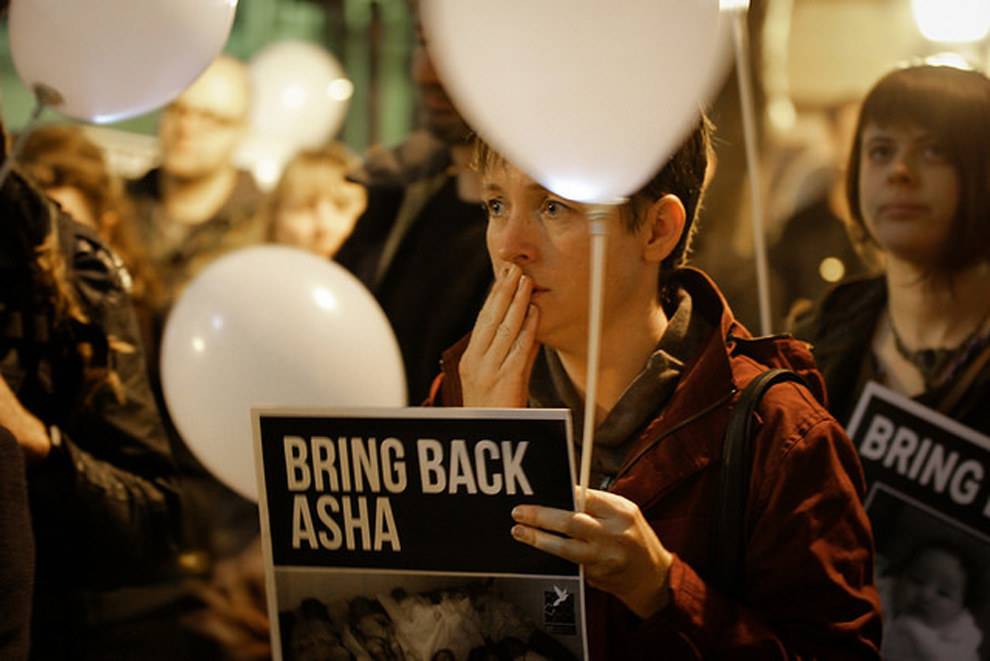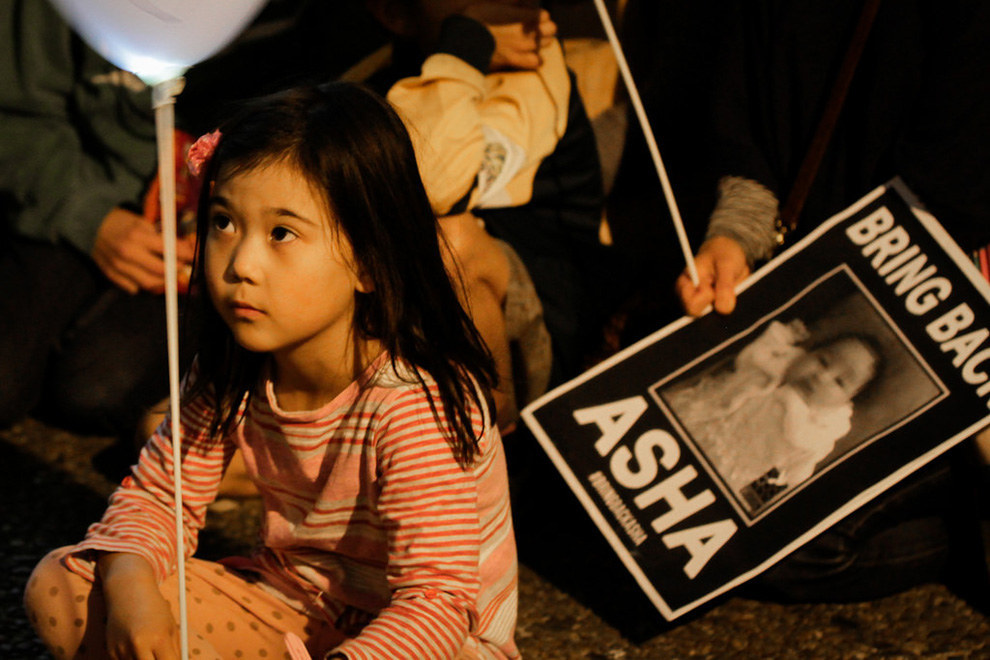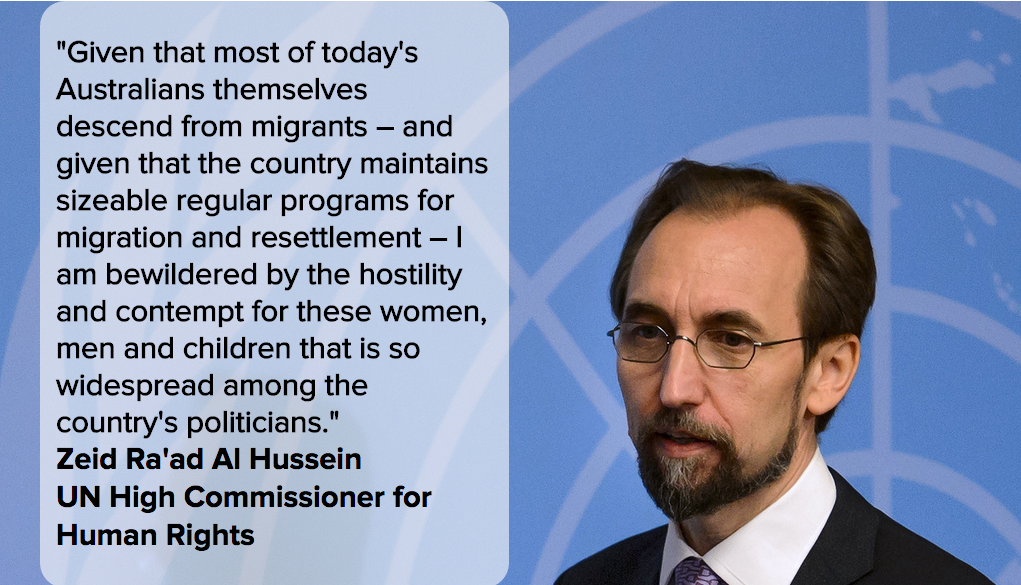This is baby Asha. Her name means 'hope' in Nepalese. She's the youngest detainee at the immigration detention centre on Nauru.

But unlike the other people detained on Nauru, Asha was born in Australia.
Born in a hospital in Darwin and issued with an Australian birth certificate, Asha is classified as an "unauthorised maritime arrival" under changes to the Migration Act that came in to effect at the end of last year.
Asha's mother, Abhaya, was moved from Nauru to immigration detention in Darwin to give birth, because the facilities on the island are not deemed adequate for childbirth. At the same time the Australian government says Nauru is an appropriate home for a five month old baby.
Unfortunately, that has not turned out to be the case.
In December last year, around the same time that Abhaya was moved to Darwin, then-immigration minister Scott Morrison was trying to pass sweeping changes to the Migration Act through the Senate.

The changes to the law included the reintroduction of temporary protection visas and restricting the definition of who is eligible for refugee status in Australia. As part of a deal with senator Ricky Muir, Morrison agreed to allow 31 babies and their families (including baby Ferouz) to stay in Australia to have their protection claims processed as a "special one-off arrangement." The deal applied to all babies born before December 4, 2014.
That means Asha was the first of 25 babies to be transferred to Nauru, because she missed the cut-off date set under the Muir-Morrison deal.

At 4:30 one morning in early June, Asha's parents were woken by authorities and put on a plane to be transferred back to Nauru.
OPERATION NAURU BABY DUMP FIRST BABY back to hell- taken from MITA at 4.30am Thursday
Their lawyer, Mark Thomas, said there was nothing he could do because the transfer happened in the middle of the night and he wasn't told of the family's removal until they had already arrived in Nauru. It also means they can't take court action, because they are no longer in Australia.
Not only was the transfer traumatic for the young family, it was also the cause of a medical emergency for Asha when the mother encountered difficulties breastfeeding.
"She was so distressed that she felt that her milk supply had dried up," breastfeeding expert Dr Karleen Gribble told BuzzFeed News.


Dr Gribble is from the University of Western Sydney's School of Nursing and Midwifery, and was called up by a refugee advocate to see if she could use her expertise to help Asha's mother.
"Breastmilk doesn't dry out because of stress. If stressed it can slow the release of milk, the baby can get fussy and mothers interpret it as meaning the milk has gone. Under those circumstances, we need to provide mothers with a safe space to receive encouragement and support," she said.
But Dr Gribble says the type of support just isn't there for Asha's mother. At one stage, she had stopped breastfeeding for 10 days, so she has been coaching her over the phone.
"It did sound quite dire," she said. "The baby hadn't had a wet nappy overnight, there were alarming signs of health. The baby was mostly being fed water and rice cereal, and that is just plain dangerous."
Dr Gribble, who specialises in breastfeeding in emergency situations says there was better support for mothers in disaster zones than there is on Nauru.

"The infant feeding support is not as good as what international aid and development organisations were providing after the Haiti earthquake in 2010 and that was an enormous disaster, with hundreds of thousands of people affected," she said.
She says Abhaya was given a powdered formula that had made her baby sick, and then when she was given a different type of formula, she was expected to wash the bottles in a tap outside her tent, without any detergent.
"The family is living in a tent partitioned off with plastic into rooms for different families. Where she is staying is not close to amenities," Dr Gribble told BuzzFeed News.
Natasha Blucher is a former caseworker at Nauru detention centre, and echoes her concerns. She received this text message from Abhaya in June.


Blucher told BuzzFeed News that she was informed by other caseworkers that the camp would flood on rainy nights during the wet season, and when staff were forced to evacuate they were told to leave families behind "in flooded tents with ankle-deep water."
Other dangers included dengue fever and disease from bugs and vermin.

She is very stressed about the presence of mosquitos and other types of bugs and vermin, and keeping them away from her baby. Dengue fever is quite common in Nauru, and when I worked there we were all very careful to use repellant all the time. As we know, most mothers would not feel comfortable using repellant on an infant, so I think Abhaya's concern about the mosquitos is very justified - dengue fever presents a very real risk to her child's life. Also, the entire camp is covered in phosphate rock gravel, including Area 9 where they are located. The accommodation is in white tents with a chipboard floor. To my knowledge there would not be any safe space to put the baby down and let her roll or learn to crawl, or to have 'tummy time'. Abhaya talks a lot about this - she is very stressed because it's hard for her to put the baby down anywhere and be sure that it's safe and clean.
The story of Asha has struck a chord with a group of Australian mothers, who held rallies across the country to call on the government to get the baby out of detention on Nauru.

Dr Gribble has been one of the driving forces behind the Save Asha campaign, despite never having been involved in refugee advocacy before.
"We've got lots of mums who've struggled to breastfeed themselves, or found formula really difficult. They're relating to what she's experienced and putting themselves in her shoes, they realise how powerless she must feel," she told BuzzFeed News.

"I think every mum knows that it's scary to have a five-month-old baby at the best of times, even when you have a stable future, a regular income, a safe house to live in and friends and family to help," said Natasha Blucher.
"Baby Asha is no different to any other Australian baby, and her mum is no different to any mother struggling to do the best for her child. I think that our core Australian values include the view that mothers and babies are sacred. To hear about Asha and her family being subject to such appalling treatment should, and does, make Australians say 'enough is enough.'"
Another group, Mums 4 Refugees has taken up the cause, and is urging people to send their local MPs letters and a pair of baby booties to remind the government that its policies affect real babies.

One of the founding members, Tara Crisp says the group is not politically motivated, and they originally started as a mothers group in Sydney.
"We're just mums from completely different backgrounds, and different political backgrounds too, but we are against what's happening to asylum seekers right now," she told BuzzFeed News.
"It's really hard, that first year of raising a child. You don't get enough sleep, it's emotionally very draining, you're always worried that something might be wrong. The thought of having to do that in conditions in Nauru, with no support or mums groups you can talk to, and without hygienic equipment, it's a scary thought."
With serious allegations of sexual and physical assault continuing to emerge from Nauru, Australia is also facing another round of scathing criticism from the United Nations.

In a speech to the Human Rights Council on June 15, the commissioner described Australia's treatment of asylum seekers as "a poor benchmark for regional processing" and in violation of the Convention on the Rights of the Child.
There are now reports that a second baby has been transferred to Nauru despite a risk assessment from the centre's welfare service provider stating that having babies on the island could be "potentially catastrophic."
BuzzFeed News has obtained a letter sent to Greens senator Sarah Hanson-Young from immigration minister Peter Dutton.

In the letter dated June 25, he writes that it would be "inappropriate" to discuss information about particular detainees due to privacy concerns.
Minister Dutton told the senator that "in preparation for the return of families to the Nauru RPC following the birth of a child, a risk assessment was undertaken to ensure appropriate services and support is available to families with young babies."
Measures included refurbishing bathing facilities to be more appropriate for infants, increasing the family living space and providing infant-friendly flooring in the tents.
Hanson-Young, whose party is opposed to offshore processing, says Peter Dutton and Tony Abbott are using "babies in their political fight over border protection."
"No child deserves a life locked in a tent prison, and certainly not a baby, born in Australia," she said.

The campaign is gaining momentum online, but organisers say they are only getting form letters in response.
A response from Coalition MP Jamie Briggs obtained by BuzzFeed News reads "I appreciate you bringing this to my attention; I have noted your views. While I cannot comment on this specific case, I would like to address the broader issue of the Government's border protection policies."
It then goes on to explain the success of Operation Sovereign Borders, and ends with a description of the government's action in relation to children in the legacy caseload from Labor.
"With the success of stopping the boats, there are now fewer children in detention and those remaining will be moved out into the community," the letter reads.
The government's refusal to acknowledge their concerns is not just disappointing, but deeply troubling for the women who are trying to help.

"I just want this baby to be ok," says Dr Gribble. "I'm lying awake at night just really scared. Babies are so vulnerable, they really have special needs and you've really got to look after them."
She says even if the government continues to move babies to Nauru, the least they can do is have adequate infant feeding support for mothers, and proper education about breastfeeding and formula feeding.
Meanwhile, Dr Gribble says she is just trying to help Abhaya, who is struggling to get through each day.
"The psychological impact on these children is massive, because their caregivers are so traumatized, even before they arrive in Nauru," she said.
"She's just so sad and quite desperate. I've spent quite a lot of time talking to her, about how much her baby needs her, how important she is to her baby, and even if she's feeling sad how she needs to smile at her baby."
BuzzFeed News contacted the office of the Immigration Minister Peter Dutton and was told by a spokesperson that they did not have any comment on the matter of baby Asha.
